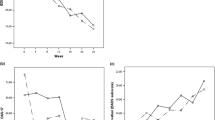Abstract
The contributions of changes in cognitions (degree of belief in “automatic thoughts”) and the patient's relationship with his therapist to mood changes occurring during sessions of cognitive therapy were examined in data collected from 17 depressed and anxious patients. Results showed that both changes in automatic thoughts and the patient's relationship with his therapist made independent, additive contributions to mood changes. In addition, two patient characteristics (initial degree of belief in automatic thoughts and diagnosis) made significant unique contributions to mood changes. The stronger the patient's initial belief in his automatic thoughts, the smaller the mood change occurring in the session. Smaller mood changes also occurred in patients with a personality disorder diagnosis. These results suggest that mood changes in cognitive therapy sessions are a function of three types of factors: technical cognitive therapy interventions, the patient's relationship with his/her therapist, and patient characteristics. A multiple regression model with independent variables measuring these factors accounted for 89% of the variance in mood change in the session.
Similar content being viewed by others
References
Anastasi, A. (1976).Psychological testing. New York: Macmillan.
Bandura, A. (1977).Social learning theory. Englewood Cliffs, New Jersey: Prentice-Hall.
Beck, A. T. (1972).Depression: Causes and treatment. Philadelphia: University of Pennsylvania Press.
Beck, A. T., Rush, A. J., Shaw, B. F., & Emery, G. (1979).Cognitive therapy of depression. New York: Guilford Press.
Blackburn, I. M., Bishop, S., Glen, A. I. M., Whalley, L. J., & Christie, J. E. (1981). The efficacy of cognitive therapy in depression: A treatment trial using cognitive therapy and pharmacotherapy, each alone and in combination.British Journal of Psychiatry, 139 181–189.
Burns, D. D. (1980).Feeling good: The new mood therapy. New York: William Morrow.
Garfield, S. L. (1978). Research on client variables in psychotherapy. In S. L. Garfield & A. E. Bergin (Eds.),Handbook of psychotherapy and behavior change (2nd ed.). New York: Wiley.
Golin, S., Sweeney, P. D., & Shaeffer, D. E. (1981). The causality of causal attributions in depression: A cross-lagged panel correlational analysis.Journal of Abnormal Psychology, 90 14–22.
Hamilton, E. W., & Abramson, L. Y. (1983). Cognitive patterns and major depressive disorder: A longitudinal study in a hospital setting.Journal of Abnormal Psychology, 92 173–184.
Kovacs, M., Rush, A. J., Beck, A. T. & Hollon, S. D. (1981). Depressed outpatients treated with cognitive therapy or pharmacotherapy.Archives of General Psychiatry, 38 33–41.
Lewinsohn, P. M., Steinmetz, J. L., Larson, D. W., & Franklin, J. (1981). Depression-related cognitions: Antecedent or consequence?Journal of Abnormal Psychology, 90 213–219.
Murphy, G. E., Simons, A. D., Wetzel, R. D., & Lustman, P. J. (1984). Cognitive therapy and pharmacotherapy: Singly and together in the treatment of depression.Archives of General Psychiatry, 41 33–41.
Persons, J. B. (in press). The advantages of studying psychological phenomena rather than psychiatric diagnoses.American Psychologist.
Persons, J. B., & Rao, P. A. (1985). Longitudinal study of cognitions, life events and depression in psychiatric inpatients.Journal of Abnormal Psychology, 94 51–63.
Peterson, C., Luborsky, L., & Seligman, M. E. P. (1983). Attributions and depressive mood shifts: A case study using the symptom-context method.Journal of Abnormal Psychology, 92 96–103.
Raps, C. S., Peterson, C., Reinhard, K. E., Abramson, L. Y., & Seligman, M. E. P. (1982). Attributional style among depressed patients.Journal of Abnormal Psychology, 91 102–108.
Rush, A. J., Beck, A. T., Kovacs, M., & Hollon, S. (1977). Comparative efficacy of cognitive therapy and pharmacotherapy in the treatment of depressed outpatients.Cognitive Therapy and Research, 1 17–37.
Seligman, M. E. P., Abramson, L. Y., Semmel, A., & von Baeyer, C. (1979). Depressive attributional style.Journal of Abnormal Psychology, 88 242–247.
Strupp, H. H., & Hadley, S. W. (1979). Specific vs. nonspecific factors in psychotherapy.Archives of General Psychiatry, 36 1125–1136.
Teasdale, J. D., & Fennell, M. J. V. (1982). Immediate effects on depression of cognitive therapy interventions.Cognitive Therapy and Research, 6 343–352.
Author information
Authors and Affiliations
Rights and permissions
About this article
Cite this article
Persons, J.B., Burns, D.D. Mechanisms of action of cognitive therapy: The relative contributions of technical and interpersonal interventions. Cogn Ther Res 9, 539–551 (1985). https://doi.org/10.1007/BF01173007
Issue Date:
DOI: https://doi.org/10.1007/BF01173007




